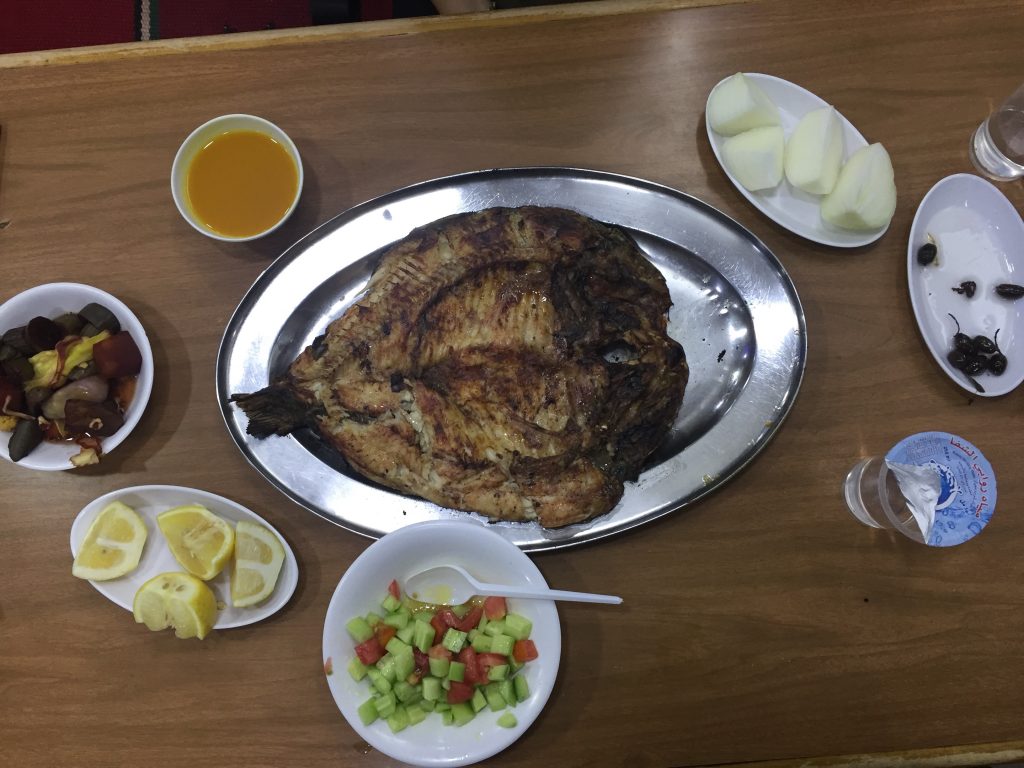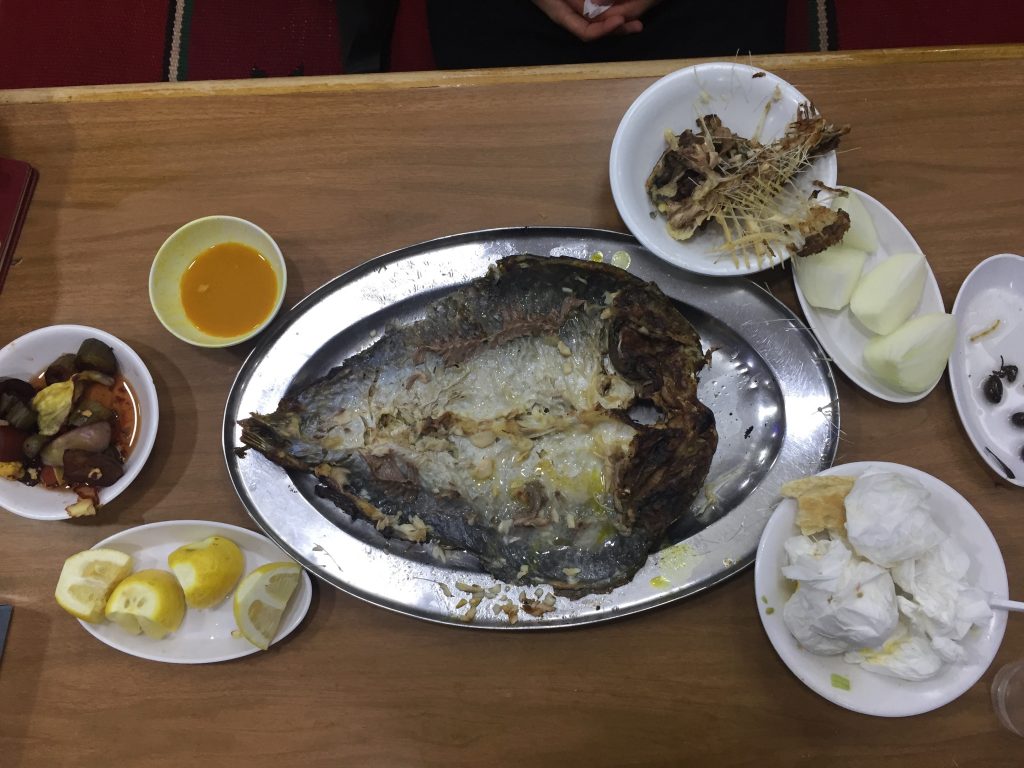
The incredible masgouf at the Al-Mahar Fish Restaurant, in Amman – the crooked photo is proof of my relevant excitement
I am often reluctant in indulging discussions over the “great contributions” immigrant and refugee populations make to their host countries. I do understand their point, after all, part of celebrating diverse societies is to acknowledge why they are better. I also understand that those advocates, the ones that highlight this aspect of the theme, they mean well. This is, however, a dangerous paradigm to further.
Because when we emphasize what a person seeking shelter can “bring” to a said country, we can also be depriving people of their basic humanity – after all, before any contribution, or “good” one might be bringing, are we not all human? People, humans, especially those fleeting, they should be welcomed on the grounds of their humanity, not anything else. This choice of rhetoric then furthers the narratives of good migrant/bad migrant, good refugee/bad refugee, dangerous standards which can work fundamentally against more humane and accessible policies on the issue.
I am also wary of such narrative because, words and slogans, they matter and can be easily co-opted. As Mariame Kaba aptly put here, keeping families together is important, but what does that mean if they are all together, but in prison?
Having said that, I will take this moment to appreciate one of the greatest contributions immigrants and refugees make to any society, which is food. Because I mean, what is not to like about food diversity? Coming from Brazil, and specifically from São Paulo, a city which prides itself about having available a wide array of cuisines, this is not only a basic a value, but really, a necessity of sorts.
I am prompted to talk about this because it has been a little over two years since I fell in love – truly, madly, deeply – with masgouf. It’s the love affair of a lifetime and even though our encounters are fleeting and too far in between, I know I shall treasure them forever.
First time I heard about masgouf was in this piece, by Jon Lee Anderson, reporting from Baghdad on the edge of the 2003 US Invasion. By then, I was a bright-eyed journalism student, and I remember taking note, a reminder for me to look for it, something virtually inaccessible at that point, as the Iraqi community in Brazil is close to non-existent.
My encounter with the dish would happen only years later, during my first time in Jordan. Me and Dina, then the greatest fixer I have ever worked with and now a friend, had had a particularly long and difficult day in Za’atari. Sweaty and famished, I was guided by her to Al-Mahar Fish restaurant, at the beginning of Wasfi Al-Tal Street, in the north-west part of Amman. Maybe it was the tiredness. Maybe the substantial hunger. But that was one of the best meals I have ever gotten in my life.
But what is masgouf, you ask? Masgouf is a Mediterranean form to prepare carp style river fish and it is considered one of Iraq’s national dishes, a classical way to prepare fish from the Tigris. It is fairly straightforward: you open the fish in half, season it and grill it in wood-fire or coal. The taste is anything but simple.
Something I was looking forward when moving to New York was to find a masgouf joint – I was certain, of all places on Earth, New York would most certainly have it. I am sad to report that until this day, I have not found such a place, despite substantial, to the point of desperate, research. One of my Manhattanite friends, born and bred, hypothesized about the political climate, ever since 2001, not being exactly receptive of Iraqi enterprises in the city. A shame, if you ask me, for the place which claims itself as one of the most accepting of all cities in the world.
So, you see, coming back to Amman, I was more than excited to eat masgouf again. Dina made me promise I would wait for her – and as you can attest from my previous post, she has been busy – so we only got to it last week. It was everything I thought it would be.
This time around, I actually did some research on the story of Al-Mahar. The place opened in 2005, founded and owned by Abu Haytham Mikha, an Iraqi refugee living in Jordan for over a decade now. His whole story is amazing, and you can read more here.
After we had finished all of the fish (image above), we took a moment to look around and observe how Iraqi families actually eat it – which often includes eating all the skin. I myself haven’t gotten to that part yet. Something to look forward to next time. Which will probably happen this week. And every week after I am in Amman. Thank you, Iraq. And thank you, Jordan.
Posted By Teresa Perosa (Jordan)
Posted Aug 3rd, 2018



5 Comments
Corinne Cummings
August 3, 2018
Hi Teresa, I liked your commentary on refugees. I think this is an important conversation that everyone should be engaged in, particularly due to our current political climate that is not only occurring within the United States but all over the globe. The issue of xenophobia is glaring everywhere in our world — it makes me truly sad that humanity is not prioritized, rather bureaucracy is instead. It’s comforting to hear your words — it’s highly appreciated. I loved the pictures of your meal; it looked delicious. Enjoy your last few weeks in Jordan. I am looking forward to reading your blogs. Take care. Best, Corinne
colleen denny
August 4, 2018
Great blog Teresa. Miss you! You’re doing great things!
iain
August 5, 2018
Masgouf sounds wickedly good! I totally agree that refugees and immigrants bring many good things, including food. By acknowledging this I don’t think we are somehow diminishing their humanity, or our obligation to provide them with shelter and asylum. Humanity means, in part, being social and means giving and receiving to others, doesn’t it? Interesting blog!
Princia Vas
August 6, 2018
Very interesting and heartwarming post! Thank you for all your good work, Teresa 🙂
Ali
August 6, 2018
Teresa, that looks so good! I am glad you finally got to reunite with masgouf – I hope I get to try it someday! Keep up the good work.